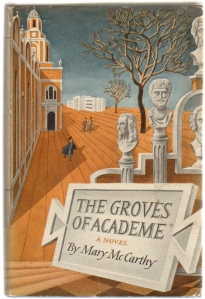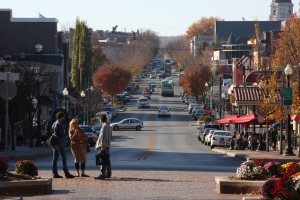I grew up in Iowa City, a midwestern university town. Was it Paradise? Charles R. Frederick Jr., director of the Academic Student Center at Indiana University, thinks so. In his fascinating essay, “Growing up Mennonite, Growing up Hawkeye,” he describes growing up in Iowa City. He says,
I often tell my own children that they grew up ‘in Paradise.’ Their version of the place is Bloomington, Indiana. But I was there first; Iowa City was a great place to grow up.
I yearned to move to a big city. But, coincidentally, like Frederick, I moved to Bloomington, Indiana, which is leafy, green, lush, and more paradisiacal in terms of climate. In both towns, there are great libraries, beautiful tree-lined streets, lush gardens, a food co-op, foreign films at the Union, museums, poetry and fiction readings (Borges, Tillie Olsen…), and you didn’t need a car. I didn’t realize what I had till I left.
 But university towns, whether the schools are state-funded or posh, aren’t for every literary hero. I have just reread Hardy’s Jude the Obscure, and am musing on how Christminster, the Oxford of Hardy’s novel, did not prove to be Paradise for Jude. A stone-mason and an autodidact, he taught himself Greek and Latin. When he moves to Christminster, he is told he will never be admitted to the university, could not possibly compete with men educated at Eton, and should stick to stone. And then things go from bad to worse…so bad, so much worse. His girlfriend, the brilliant, pretty Sue Bridehead, who doesn’t like to have sex, finally leaves her husband, with whom she also did not like to have sex, and commits herself to Jude only after his wife, Arabella, a voluptuous barmaid, returns from Australia and tries to get him back. Later, their son, Father Time (yes, really), kills his siblings and commits suicide, because he understands they are a burden to Jude and Sue. And that’s the end of Jude.
But university towns, whether the schools are state-funded or posh, aren’t for every literary hero. I have just reread Hardy’s Jude the Obscure, and am musing on how Christminster, the Oxford of Hardy’s novel, did not prove to be Paradise for Jude. A stone-mason and an autodidact, he taught himself Greek and Latin. When he moves to Christminster, he is told he will never be admitted to the university, could not possibly compete with men educated at Eton, and should stick to stone. And then things go from bad to worse…so bad, so much worse. His girlfriend, the brilliant, pretty Sue Bridehead, who doesn’t like to have sex, finally leaves her husband, with whom she also did not like to have sex, and commits herself to Jude only after his wife, Arabella, a voluptuous barmaid, returns from Australia and tries to get him back. Later, their son, Father Time (yes, really), kills his siblings and commits suicide, because he understands they are a burden to Jude and Sue. And that’s the end of Jude.
Might I have been a Jude if I hadn’t grown up in Iowa City? Well, no, I don’t see myself as the heroine of a gloomy novel (not Hardy’s masterpiece, whatever people tell you), but I studied classics, like Jude. And I climbed a class or two by getting degrees in literature and classics. So God bless midwestern university towns, and all the loans, grants, and assistantships!
Wouldn’t working at a university be idyllic? In 20th-century literature, many professor-heroes hate college towns. In Kingsley Amis’s Lucky Jim, Jim Dixon, who teaches medieval history at a provincial university, has no interest in his subject, makes faces behind the back of the department chair, gets drunk at parties, and is aware of the absurdity of an article he is trying to publish, with the farcical title, ” The economic influence of the developments in shipbuilding techniques, 1450 to 1485.” He gets fired–and that’s a blessing! You can’t live a good life at a provincial university in Amis’s world.
 In Mary McCarthy’s The Groves of Academe, a satire of an experimental college during the McCarthy era, the hero, Henry Mulcahy, a Joyce scholar and instructor at a small “progressive” college in Pennsylvania, learns that his contract will not be renewed. It is not a good time to be a leftist: he was fired from a university in California because of his radical writings in The Nation. Hen manipulates his friends to intercede on his behalf: he says his wife Cathy has a severe heart condition and that any shock could kill her, and he implies that the FBI is out to get him and that Hoar has caved to pressure. When his friends learn that Hen has lied (Cathy was ill after her last pregnancy, but isn’t now, and Hen was never a member of the Communist party), the group is furious. Although Hen is brilliant and popular, how far must they go to protect him? (I wrote more about this here.)
In Mary McCarthy’s The Groves of Academe, a satire of an experimental college during the McCarthy era, the hero, Henry Mulcahy, a Joyce scholar and instructor at a small “progressive” college in Pennsylvania, learns that his contract will not be renewed. It is not a good time to be a leftist: he was fired from a university in California because of his radical writings in The Nation. Hen manipulates his friends to intercede on his behalf: he says his wife Cathy has a severe heart condition and that any shock could kill her, and he implies that the FBI is out to get him and that Hoar has caved to pressure. When his friends learn that Hen has lied (Cathy was ill after her last pregnancy, but isn’t now, and Hen was never a member of the Communist party), the group is furious. Although Hen is brilliant and popular, how far must they go to protect him? (I wrote more about this here.)
 Ah, well, university towns are not ideal for everyone. And since my mother died, I go less often to Iowa City. My hometown has changed: the downtown is undergoing a second urban renewal, there is ugly development south of downtown, but most of the town survives intact, and is still very pretty. It was a great place to grow up: bicycling to the quarry to swim, looking at the Jackson Pollack at the art museum, co-writing satires of the classics department with my fellow Greek students, sitting by the river, eating at the Pagliai’s Pizza, and hiking through Hickory Hill Park.
Ah, well, university towns are not ideal for everyone. And since my mother died, I go less often to Iowa City. My hometown has changed: the downtown is undergoing a second urban renewal, there is ugly development south of downtown, but most of the town survives intact, and is still very pretty. It was a great place to grow up: bicycling to the quarry to swim, looking at the Jackson Pollack at the art museum, co-writing satires of the classics department with my fellow Greek students, sitting by the river, eating at the Pagliai’s Pizza, and hiking through Hickory Hill Park.
I had so much fun!
And that’s important, as life goes on.


